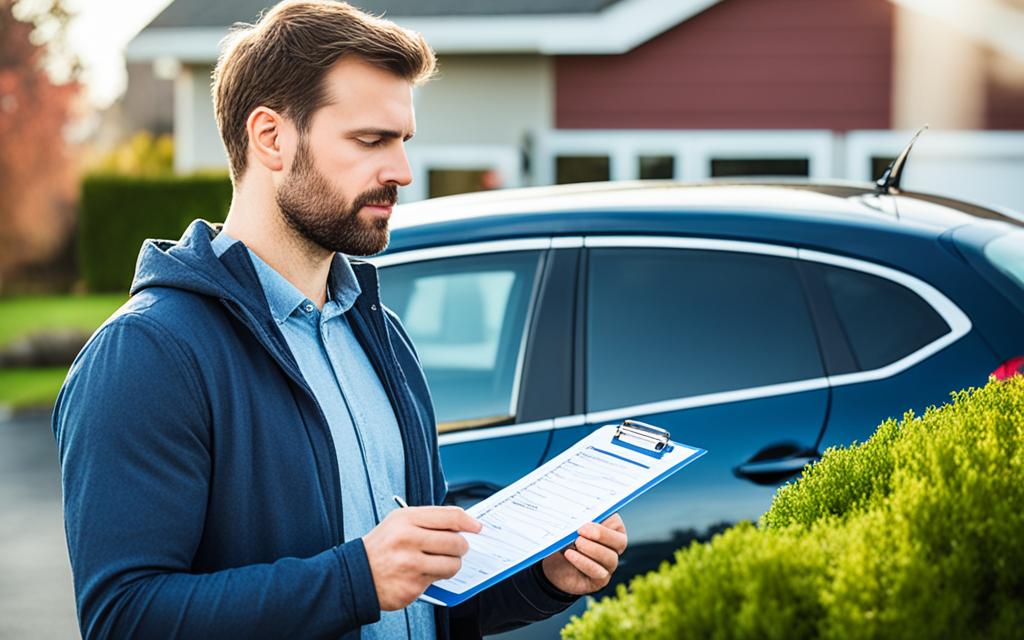Welcome to our comprehensive guide on the car buying process timeline. If you are planning to purchase a car, you might be wondering, “How long does it take to buy a car?” This article will provide you with valuable insights into the duration of purchasing a car, helping you navigate the process smoothly.
Buying a car involves several steps, including researching and selecting the right vehicle, securing financing, visiting dealerships, negotiating the price, completing paperwork, and finalizing the purchase. Each of these stages can contribute to the overall time it takes to buy a car. By understanding the various factors affecting the car buying process, you can better manage your time and make informed decisions.
Throughout this guide, we will break down the car buying journey and explore each step in detail. We will discuss the time it typically takes for research, financing, dealership visits, negotiation, paperwork, and more. Additionally, we will provide tips and strategies to streamline the process and ensure a successful car purchase.
So, if you are ready to dive into the world of car buying and discover how long it takes to buy a car, let’s get started!
Key Takeaways:
- The car buying process can vary in duration based on various factors.
- Researching and selecting the right car is a crucial step that can impact the overall timeframe.
- The financing and loan approval process can take time depending on your credit history and lender’s requirements.
- Visiting dealerships, test driving cars, and negotiating the price can add to the duration of buying a car.
- Completing paperwork and documentation is an essential part of finalizing the purchase.
Factors Affecting the Car Buying Process
When it comes to the car buying process, several factors can significantly influence the time it takes to make a purchase. These factors can range from extensive research and financing options to negotiation tactics. Understanding these factors will help you navigate the car buying journey more efficiently and make informed decisions.
Research and Comparison
One of the most important factors affecting the car buying process is the time spent on researching and comparing different car models, features, and prices. Gathering information about the vehicles you are interested in, reading customer reviews, and comparing prices can help you make an informed decision and find the right car that fits your needs.
Financing Options
Securing financing for your car plays a crucial role in the buying process. It involves exploring different loan options, gathering necessary documents, and applying for loan approval. The duration can vary depending on factors such as credit history and the lender’s decision-making process.
Negotiation and Price
The negotiation stage can significantly impact the time it takes to finalize a car purchase. Negotiating the price with the dealer, discussing additional features, and finalizing the terms of the agreement can take time. It is essential to be prepared and have a clear understanding of the market value and your budget to negotiate effectively.
Vehicle Availability
Another factor that can influence the duration of the car buying process is the availability of the specific vehicle you are interested in. If the car is in high demand or has limited stock, it may take longer to find and secure the desired vehicle.
Overall Process Efficiency
Efficiency in navigating the car buying process can vary depending on your organizational skills, knowledge, and previous experience. Being well-prepared, having all the necessary documents, and understanding the steps involved can help streamline the process and reduce the overall time needed to purchase a car.
| Factors Affecting Car Buying Process | Impact on Time |
|---|---|
| Research and Comparing Options | Can extend the buying process if not done thoroughly. |
| Financing Options | Waiting for loan approval can prolong the process. |
| Negotiation and Price | Lengthy negotiations can add time to the purchasing process. |
| Vehicle Availability | Waiting for a specific vehicle can extend the process. |
| Overall Process Efficiency | Well-preparedness can expedite the buying process. |
In conclusion, the time it takes to buy a car can be influenced by various factors. Conducting thorough research, exploring financing options, negotiating effectively, considering vehicle availability, and maintaining process efficiency are key elements in managing the length of the car buying journey.
Researching and Selecting the Right Car
When it comes to buying a car, thorough research and careful selection are crucial steps in ensuring you find the right vehicle that meets your needs and preferences. By devoting time to researching car options and comparing different models and features, you can make an informed decision that you’ll be satisfied with for years to come.
Researching car options allows you to gain valuable insights into the variety of vehicles available in the market. Whether you’re interested in a compact sedan, a spacious SUV, or an eco-friendly hybrid, understanding the features and specifications of different car models empowers you to make a well-informed decision.
One effective way to research car options is by visiting manufacturer websites and exploring their vehicle lineups. By reviewing the specifications, features, and available trims, you’ll be able to narrow down your choices based on factors such as performance, fuel efficiency, technology, safety features, and more.
Additionally, reading expert reviews and customer testimonials can provide you with valuable insights into the real-world experiences of car owners. Websites and publications dedicated to reviewing cars often provide detailed analyses, comparisons, and ratings that can help you gauge the strengths and weaknesses of different models.
Once you have gathered enough information, it’s time to compare different models and features to determine which car best suits your needs. Consider your lifestyle, budget, and the specific requirements you have in a vehicle. Are you looking for a family-friendly car with ample space? Or perhaps you prioritize fuel efficiency and environmentally-friendly features?
Comparing different models can be facilitated by creating a checklist or spreadsheet highlighting key features, dimensions, and prices. This will enable you to make side-by-side comparisons and evaluate which cars align with your requirements. Pay close attention to factors such as engine power, cargo space, safety ratings, technology and entertainment systems, and warranty coverage.
Remember, selecting the right car involves finding a balance between your desires and practicality. Don’t forget to consider factors such as maintenance costs, resale value, and insurance premiums when making your final decision.
Researching and Selecting the Right Car: A Step-by-Step Guide
- Start by identifying your requirements and preferences, considering factors such as vehicle type (sedan, SUV, etc.), fuel type (gasoline, hybrid, electric), budget, and desired features.
- Research various car models by visiting manufacturer websites, reading expert reviews, and exploring customer testimonials.
- Create a checklist or spreadsheet to compare different models and features, highlighting key factors such as performance, fuel efficiency, safety ratings, and technology.
- Schedule test drives to experience different cars firsthand and evaluate their comfort, handling, and overall driving experience.
- After careful consideration, narrow down your options to a few top contenders and revisit your checklist to ensure they fulfill your requirements.
By investing time in researching and selecting the right car, you can make a confident decision that aligns with your needs and preferences. Don’t rush the process, as finding the perfect vehicle can be an enjoyable and rewarding experience.
Financing and Loan Approval
Applying for financing is a crucial step in the car buying process. To help you navigate through this stage efficiently and understand its duration, we have laid out the essential steps involved in car financing and loan approval.
Step 1: Research and Compare Financing Options
Before applying for car financing, it’s important to research and compare different options to find the best fit for your financial situation. Here are some popular financing options:
- Bank Loans: Many banks offer auto loans at competitive interest rates.
- Dealership Financing: Dealerships often provide financing options through partnerships with lending institutions.
- Online Lenders: Online lenders offer convenience and flexibility with their application processes and loan terms.
By exploring these options, you can make an informed decision and choose the financing that suits your needs.
Step 2: Apply for a Car Loan
Once you have selected your preferred financing option, it’s time to apply for a car loan. This typically involves the following:
- Gathering Required Documents: Lenders will require documents such as proof of income, identification, and proof of insurance.
- Filling out the Application: Complete the loan application, providing accurate and up-to-date information.
- Submitting the Application: Submit your completed application along with the required documentation to the lender.
Step 3: Loan Approval Duration
The loan approval duration can vary based on several factors, including the lender’s process and workload. It typically ranges from a few hours to a few business days. During this time, the lender will evaluate your application, review your credit history, and assess your ability to repay the loan.
Step 4: Loan Approval and Terms
Once your loan application has been approved, you will receive an offer with the loan terms and conditions. These may include the loan amount, interest rate, repayment schedule, and any additional fees. Take the time to carefully review these terms and make sure they align with your budget and expectations.
Having a clear understanding of the car financing process and loan approval duration will help you plan your car buying timeline effectively. Now that you know the necessary steps involved in financing your car purchase, you can proceed with confidence to the next stage of the car buying process.
| Pros of Car Financing | Cons of Car Financing |
|---|---|
|
|
Visiting Dealerships and Test Driving
Once you have narrowed down your options through research, the next step in the car buying process is visiting dealerships and test driving the vehicles on your shortlist. This is an exciting stage where you can get a firsthand experience of the cars you are interested in and make comparisons to find the perfect fit for your needs.
When you visit a dealership, you’ll have the opportunity to interact with sales professionals who can provide valuable insights into the features, specifications, and performance of different models. They can also address any questions or concerns you may have.
During the dealership visits, take your time to thoroughly inspect the cars and consider factors like comfort, interior space, technology features, and overall appearance. It’s also important to test drive the vehicles to get a feel for how they perform on the road.
The duration of a test drive can vary depending on the dealership’s policy, but it typically lasts around 30 minutes to an hour. Use this time to evaluate the car’s handling, acceleration, braking, and overall driving experience. Pay attention to factors like noise levels, visibility, and ergonomic design as well.
Pro Tip: It’s a good idea to test drive multiple cars within the same segment to compare their performance and features. This will help you make an informed decision.
Once you have test driven the cars and gathered all the necessary information, you can start narrowing down your options further. Take note of your impressions, preferences, and how well each car meets your requirements.
Now, let’s take a look at a comparison table that showcases key factors to consider during dealership visits and test drives:
| Factors | Considerations |
|---|---|
| Comfort | Check the seating, legroom, and overall interior comfort. Look for features like adjustable seats and climate control. |
| Technology | Assess the infotainment system, connectivity options, navigation, and driver-assistance features. |
| Safety | Review the car’s safety ratings, available safety features, and advanced driver-assistance systems (ADAS). |
| Performance | Evaluate the acceleration, handling, braking, and overall performance of the vehicle. |
| Fuel Efficiency | Consider the car’s fuel efficiency and how it aligns with your daily commuting needs. |

Remember, the dealership visit and test drive phase is crucial for making an informed decision and finding the right car for you. Take your time, ask questions, and trust your instincts to ensure a satisfying car buying experience.
Negotiating the Price
When it comes to buying a car, negotiating the price is a crucial step in getting the best deal possible. Price haggling, also known as price negotiation, can save you a significant amount of money and help you secure the car you want at a more affordable price.
Effective negotiation skills can not only help you lower the purchase price but also potentially reduce your monthly payments and save on financing costs. However, negotiating the price of a car requires preparation and a strategic approach.
Here are some tips to help you negotiate the best price for your next car:
- Do Your Research: Before entering the negotiation process, gather information about the car’s market value, any available incentives, and the average selling price in your area. This knowledge will empower you during the negotiation.
- Set a Budget: Determine the maximum amount you are willing to pay for the car. This will guide your negotiation strategy and help you avoid overspending.
- Start Low: Begin the negotiation with a lower offer than the listed price. This provides room for the seller to make a counteroffer, and you can gradually work towards a mutually agreeable price.
- Be Assertive, Yet Polite: Confidence is key when negotiating. Clearly express your expectations and reasons for your offer while maintaining a respectful tone.
- Consider Timing: Dealerships may be more willing to negotiate towards the end of the month or during slower sales periods when they are eager to meet their quotas.
“Negotiation is not about trying to win or dominate; it’s about finding a solution that works for both parties involved.”
Remember, negotiation is a two-way process. The goal is to reach a mutually beneficial agreement that satisfies both the buyer and the seller. Stay calm, maintain open communication, and be prepared to compromise to find common ground.
By honing your negotiation skills and following these tips, you can increase your chances of successfully negotiating the price of your next car, saving money, and driving away with a great deal.
| Benefits of Negotiating the Price | Considerations |
|---|---|
| Lower purchase price | Be prepared to walk away if the deal is not satisfactory |
| Potential savings on financing costs | Understand the market value and avoid overpaying |
| Reduced monthly payments | Respectful and assertive communication is important |
Completing the Paperwork and Documentation
Once you’ve found the perfect car and negotiated the price, it’s time to complete the necessary paperwork and documentation to finalize the purchase. This process involves several important steps that ensure the legal transfer of ownership and protect you as the buyer.
One crucial aspect of completing the paperwork is vehicle registration. This involves registering your newly purchased car with the appropriate government agency, typically the Department of Motor Vehicles (DMV) in your state. The registration process requires filling out specific forms, providing proof of ownership, and paying any applicable registration fees. Remember to bring your identification, proof of insurance, and the required documentation provided by the seller.
Another essential part of the documentation process is obtaining car insurance. In most states, car insurance is mandatory, and proof of coverage is required before driving the vehicle off the lot. Contact your insurance provider to add the new car to your policy or research and compare quotes from different insurers to find the best coverage options for your needs.
The title transfer is another crucial element of completing the paperwork. The title serves as legal proof of ownership and must be properly transferred from the seller to the buyer. Depending on your state’s requirements, you may need to visit the DMV or a local licensing office to complete the title transfer process. Ensure that all parties involved sign the necessary documents and follow the specific guidelines provided by your state.
Completing the paperwork and documentation may seem overwhelming, but it’s an important step in the car buying process. The key is to have all the necessary documents organized and ready beforehand, ensuring a smooth and efficient transaction.
Benefits of Properly Completing the Paperwork
Properly completing the paperwork and documentation when buying a car offers several benefits:
- Legal protection: Following the correct documentation process ensures that you are the legal owner of the vehicle, protecting you from potential disputes or legal complications in the future.
- Insurance coverage: Obtaining car insurance guarantees that you are protected financially in the event of an accident or damage to your vehicle.
- Compliance with regulations: Properly registering your car and completing the necessary paperwork ensures that you are compliant with state regulations and avoid any potential penalties or fines.
- Peace of mind: Knowing that all the paperwork is properly completed gives you peace of mind, allowing you to enjoy your new car without worrying about any outstanding legal or administrative issues.
By following the documentation process diligently, you can complete the purchase of your new car with confidence and peace of mind.
Finalizing the Purchase and Delivery
Once you’ve done your research, visited dealerships, negotiated the price, and completed the necessary paperwork, it’s time to finalize your car purchase and arrange for the delivery of your new vehicle. This section will guide you through the final steps of the car buying process, ensuring a smooth transition from buyer to owner.
Firstly, you’ll need to sign the contract to officially seal the deal. The contract will outline the terms and conditions of your purchase, including the agreed-upon price, any warranties or guarantees, and other important details. Make sure to carefully review the contract before signing and seek clarification on anything you’re unsure about.
Next, it’s time to make the payment for your new car. This can be done through various methods, such as cash, check, or financing. If you’re financing the purchase, make sure to follow the instructions provided by your lender and complete any necessary paperwork or online processes to finalize the financing agreement.
Once the payment has been made, you can then proceed to arrange for the delivery of your vehicle. Depending on the dealership and your location, there may be different options available for vehicle delivery. Some dealerships may offer home delivery services, while others may require you to pick up the car from their location.
If you opt for home delivery, you can expect the dealership to coordinate a convenient date and time for the delivery. They will ensure that the car is fully prepared, cleaned, and ready for you to enjoy. Alternatively, if you need to pick up the car from the dealership, make sure to schedule an appointment and allocate sufficient time to complete any remaining paperwork or documentation.
Once the delivery is complete and you have received your new car, take the time to inspect it thoroughly. Make sure everything is in order and as agreed upon during the negotiation process. Familiarize yourself with the features and controls of your new vehicle to ensure a safe and enjoyable driving experience.
“The completion of the purchase and delivery signifies the exciting moment when you finally get to take possession of your new car. It’s the culmination of your efforts and the beginning of a new chapter on the road.”
Post-Purchase Considerations
Congratulations on your new car! Now that you’ve made your purchase, there are a few important considerations to keep in mind to ensure a smooth ownership experience. From maintenance to registration and insurance, taking care of these post-purchase details will help you enjoy your new vehicle to the fullest.
Maintenance
Regular maintenance is crucial to keep your car in optimal condition and extend its lifespan. Be sure to follow the manufacturer’s recommended maintenance schedule, which typically includes tasks such as oil changes, tire rotations, and brake inspections. By staying on top of maintenance, you can identify and address any issues early on, preventing larger and costlier problems down the line.
Registration and Documentation
After buying a car, one of the first tasks is to register it with the appropriate authorities. This typically involves submitting the necessary forms and paying any required fees. Additionally, don’t forget to update your insurance policy with the new vehicle information. Keeping your registration and insurance documents up to date ensures compliance with legal requirements and provides financial protection in case of accidents or damage.
Insurance
Speaking of insurance, it’s important to review and update your coverage after buying a car. Make sure your policy adequately protects your new asset and accounts for any changes in your driving habits or circumstances. Shop around for the best rates and coverage options, considering factors such as liability coverage, comprehensive coverage, and deductibles. Comparing quotes from multiple insurers can help you find the most suitable coverage at a competitive price.
Extended Warranty and Protection Plans
While an extended warranty or protection plan is optional, it can provide extra peace of mind and financial protection for your car. These plans typically cover repairs and components not included in the manufacturer’s warranty. Before making a decision, carefully review the terms and conditions of the extended warranty or protection plan, ensuring that it aligns with your needs and offers sufficient coverage.
Additional Considerations
In addition to the above, there are other factors to consider after buying a car. For example, it’s important to familiarize yourself with the car’s features and technology. Take the time to read the owner’s manual and understand how to operate and maintain the various systems and controls.
It’s also a good idea to establish a relationship with a trusted mechanic or dealership for future maintenance and repairs. Having a reliable service provider can give you peace of mind and ensure that your car receives high-quality care.
Furthermore, consider keeping track of your car’s value over time. This can be particularly useful if you plan to trade in or sell your vehicle in the future.
By paying attention to these post-purchase considerations, you can maximize the enjoyment and value of your new car while ensuring a seamless ownership experience.

Conclusion
Buying a car is an exciting process that involves several steps and considerations. Throughout this article, we have explored the average timeline for purchasing a car and discussed various factors that can affect the duration of the car buying process.
Starting with researching and selecting the right car, it’s crucial to invest time in finding the perfect vehicle that meets your needs. Financing and loan approval are also important steps that can impact the overall timeline. Visiting dealerships, test driving different models, and negotiating the price are other factors that contribute to the duration of the car buying process.
Completing the necessary paperwork and documentation is a crucial step that should not be overlooked. From vehicle registration to insurance and title transfer, these processes ensure a smooth purchase. Finally, finalizing the purchase and arranging for the delivery of the vehicle conclude the car buying journey.
Remember, the duration of the car buying process may vary depending on individual circumstances, such as financing options, availability of the desired car, and personal preferences. Taking the time to consider all aspects and making informed decisions will ultimately lead to a successful car purchase experience.
FAQ
How long does it take to buy a car?
The duration of the car buying process can vary depending on several factors. On average, it takes around two to four weeks from research to finalizing the purchase. However, this timeline can be shorter or longer depending on individual circumstances and the complexity of the transaction.
What is the car buying process timeline?
The car buying process timeline typically involves researching and selecting a car, obtaining financing, visiting dealerships for test drives, negotiating the price, completing paperwork, and finalizing the purchase. Each of these steps can take anywhere from a few days to a couple of weeks.
How long does it take to research and select the right car?
Researching and selecting the right car can take anywhere from a few days to a few weeks. It involves comparing different models, features, prices, and reading reviews to find a car that meets your needs and preferences.
What is the duration for car financing and loan approval?
The car financing process, including loan approval, usually takes a few days to a week. It involves applying for a loan, submitting necessary documents, and waiting for the lender to review your application and approve the loan.
How much time is needed for dealership visits and test driving?
The time required for dealership visits and test driving can vary depending on how many dealerships you visit and the availability of the cars you want to test drive. On average, it takes a few hours to a couple of days to visit multiple dealerships and test drive different cars.
How long does it take to negotiate the price?
Negotiating the price of a car can take anywhere from a few minutes to several hours. It depends on factors such as the willingness of the seller to negotiate, your negotiation skills, and how quickly you can reach a mutually beneficial agreement.
What is the duration for completing the paperwork and documentation?
Completing the paperwork and documentation for a car purchase typically takes a few hours to a couple of days. This includes tasks such as vehicle registration, insurance, and title transfer. The duration can vary depending on the efficiency of the involved parties and any additional requirements specific to your location.
How long does it take to finalize the purchase and arrange for delivery?
Finalizing the car purchase and arranging for delivery can take anywhere from a few hours to a few days. It involves signing the purchase contract, making payment arrangements, and coordinating with the seller or dealer for vehicle delivery.
What considerations should I have post-purchase?
After buying a car, there are several post-purchase considerations to keep in mind. These include regular maintenance, proper vehicle registration, obtaining insurance, and understanding any warranty or service plans that come with your purchase. It’s essential to familiarize yourself with these aspects to ensure a smooth ownership experience.








